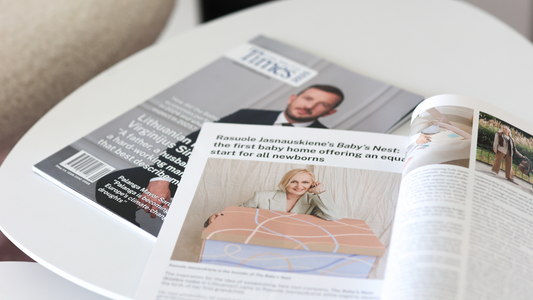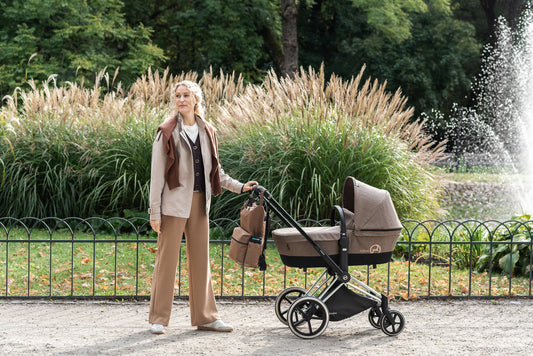While new parents are filled with joy and excitement at the birth of their child, but also a lot of fears that new parents are worried about. Many parents admit that they periodically check on their sleeping baby to make sure he is breathing. This is usually due to the fear of sudden infant death syndrome (SIDS). There isn't much information available concerning this syndrome, but if you know how to lower your risk, your anxieties will subside. The most important thing is to create the conditions for your baby to sleep safely.
What is Sudden Infant Death Syndrome (SIDS)?
The phrase "sudden infant death syndrome" (SIDS) was first used in reference to infant deaths in the late 1960s. It was revised and defined as "the sudden death of an infant under one year of age who dies from a cause that even after careful examination of the infant, such as an autopsy, could not be explained even by experts," in 1991. (Willinger et al, 1991). In fact, to date, doctors have not been able to tell why some newborns develop SIDS, to which infants under one year of age are the most at risk.
Make sure your infant sleeps safely
The greatest gift your newborn can give you is a safe sleep. Providing a secure and healthy sleep environment for your infant helps lower the incidence of SIDS. The European Safe Sleep Recommendations and the Academy of Paediatrics advise:
- Place the infant on its back. Only ever lay your infant down on the back to sleep, either day or night. According to statistics, sleeping on one's side increases the risk of SIDS. Therefore, only place your infant on his stomach during the daytime while he is awake and out of bed. The baby should be placed on its back in the cot, even if it is irritable or has a cold. To prevent "flat head syndrome," turn your baby's head left and right once every hour (positional plagiocephaly).
- When to allow to lie on the tummy? Some moms are aware of the calming effects of placing the infant on its tummy. This is true, but this posture is dangerous for the baby and carries a risk of sudden death. Allow your baby to lie on her tummy, but not in a cot – find a place on the floor or a play mat. Never leave your infant unattended when it is laying on its stomach.
- Don't sleep in the same bed. All mothers admit that this rule is very difficult to follow. You want to feel your baby close to you at night and know that he is safe. But your baby is safest in his cot. This does not mean that he has to sleep in a separate room. It's best for your baby to sleep in his cot, next to the parents' bed. If you have nursed your baby, be sure to put him back in the cot. You may keep your baby on your bed while comforting him in the Baby's Nest. Just keep the cot near by. Until your child is at least six months old and is able to roll smoothly from side to side, keep the baby's cot in the parents' room.
- Put in a separate cot. The infant should be placed in a cot without a duvet/pillow, and other without adjustable sleep aid. Never sleep with your baby in the same bed, armchair or sofa. Keep in mind that your infant shouldn't share a bed with other children. A newborn should not share a bed with anyone.
- Breastfeed your baby. This has a positive effect on his health and helps calm irritable babies. If you are nursing, you should offer your baby a pacifier only after he has learned to suck the breast. Baby can choke on a pacifier if you leave one close to the cot unattended. According to studies, babies who use pacifiers and are left unattended run a greater chance of passing away while they sleep.
- Do not allow the infant become too hot. Do not dress the baby too warmly or keep the room too warm. If your baby is sweating, remove outer clothes. At bedtime, ventilate the room where your newborn will sleep. The best room temperature for a baby to sleep in is 18 ºC.
- Don't smoke. Protect your baby from cigarette smoke before and after birth. Don't smoke in the house, and don't let visitors smoke either. Also, don't keep your baby in a room or car where someone has been smoking recently.
- Choose the right cot. Use a cot with a firm mattress. The baby's cot should be empty – except for the baby in warm (but not too warm) clothes. Do not use pillows, baby positioners, blankets or bed covers. Make sure you don't leave any objects that could get close to the baby's face.
- Safe sleep outside the home. Plan a secure sleeping area for your infant when you are travelling. Make sure the hotel provides a secure cot for your child by calling beforehand. If not, bring your own foldable cot, such as the Baby's Nest.
Keep in mind that a baby's secure sleep is important at all times, not just while you're present. If your infant will be temporarily cared for by family members or a nanny, make sure they are the only ones caring for your baby and inform them of the following advice.
IMPORTANT: Contact your paediatrician right away if you notice any symptoms of a respiratory difficulty in your infant, such as numbness or turning blue. Additionally, you should get your child medical help right away if they stop breathing, continue coughing, spitting up, or otherwise behave strangely.



